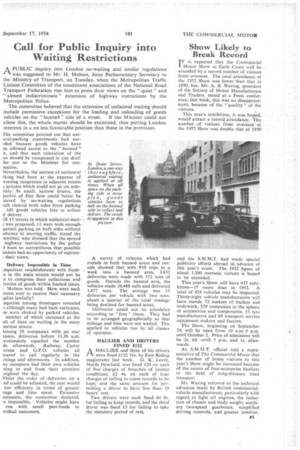Call for Public Inquiry into Waiting Restrictions
Page 91

If you've noticed an error in this article please click here to report it so we can fix it.
APUBLIC inquiry into London no-waiting and similar regulations was suggested to Mr. H. Molson, Joint Parliamentary Secretary to the Ministry of Transport, on Tuesday, when the Metropolitan Traffic Liaison Committee of the constituent associations of the National Road Transport Federation met him to press their views on the " quiet " and "almost indiscriminate" extension of highway restrictions by the Metropolitan Police.
The committee believed that the extension of unilateral waiting should include permissive exceptions for the loading and unloading of goods vehicles on the banned " side of a street. If the Minister could not allow this, the whole matter should be examined, thus putting London interests in a noless favourable position than those in the provinces.
The committee pointed out that unieral-parking experiments had suexled because goods vehicles have en allowed access to the " banned " e, and that such relaxation of the es should be recognized in any draft ler put to the Minister for connation.
Nevertheless, the success of unilateral rking had been at the expense of :teasing congestion in adjacent streets a process which could not go on indeitely. In small, narrow streets, the jective of free flow could better be lieved by no-waiting regulations lich cleared both sides from parking : left goods vehicles free to collect d deliver.
Df 17 streets in Which unilateral wait-' ; was proposed, 11 were wide enough permit parking on both sides without idrance to moving traffic, stated the nmittee, who stressed that the spread
highway restrictions by the police I been so surreptitious that possible lectors had no opportunity of express: their views.
Delivery Impossible in Time .mportant establishments with front:s in the main streets would not be e to compress their collections and iveries of goods within limited times, Molson was told. How were such ,rests ever to receive their necessary iplies lawfully?
nquiries among frontagers revealed t although many had back entrances, se were choked by parked vehicles, number of which increased as the alt of bans on waiting in the more 3ortant streets.
krnong 29 companies with no rear ranee, deliveries before 11.30 a.m. iroximately equalled the number de afterwards. Railway, Carter erson and G.P.O. vehicles all )eared to call regularly in the rnings and afternoons. In addition, ny occupiers had their own vehicles fling to and from their premises atighout the day.
Vhilst the order of deliveries on a nd could be adjusted, the cost would lost efficiency in terms of greater cage and time spent. Extensive ustments, the committee declared, e impossible. Vehicles might have run with small part-loads to ividual customers.
A survey of vehicles which had rounds in both banned areas and outside showed that with 910 trips in a week into a banned area, 3,632 deliveries were made with 512 tons of goods. Outside the banned area, the vehicles made 10,488 calls and delivered 1,477 tons. The average was 15 deliveries per vehicle with two tons, about a quarter of the total tonnage being destined for banned areas.
Deliveries could not be scheduled according to "free" times. They had to be arranged geographically so that mileage and time were not wasted. This applied to vehicles run by all classes of operator.
HAULIER AND DRIVERS FINED £122
A HAULIER and three of his drivers In. were fined £122 16s. by East Riding magistrates last week. G. K. Levitt, North Newbald, was fined £20 on each of five charges of breaches of licence conditions; £2 4s. on each of four charges of failing to cause records to be kept; and the same amount for permitting a driver to have less than 10
hours' rest.
Two drivers were each fined £4 8s. for failing to keep records, and the third driver was fined £3 for failing to take the statutory period of rest












































































































































































































